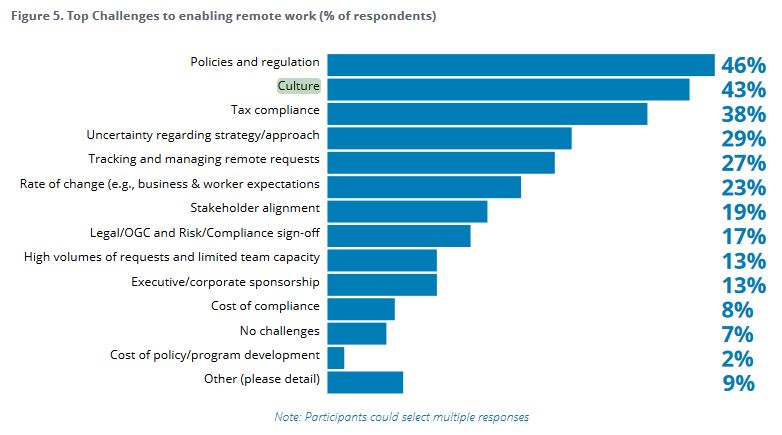 With everything that’s taken place over the last few years, remote and hybrid work is becoming increasingly common, and that trend is not going away anytime soon, if ever.
With everything that’s taken place over the last few years, remote and hybrid work is becoming increasingly common, and that trend is not going away anytime soon, if ever.
The pandemic set the precedent for this way of working, and as a result, many job seekers now expect to be able to work from home at least a couple of days per week.
But having a workforce that’s remote, or even semi-remote, presents a unique set of challenges, with one of the key questions being how to build and maintain a strong, positive, and effective remote work culture.
Truth be told, creating culture in remote teams is often easier said than done, not least because interacting with employees through a screen is so much different than when they’re in person.
In fact, this is one of the top challenges for companies trying to implement remote work policies.
As you can see from the graph below, in a survey from Deloitte, which polled more than 800 business professionals from around the world, 43% of respondents said when it comes to enabling remote work, creating a remote workplace culture is one of their top challenges.

What’s more, the survey found that 80% of the organizations these professionals work for have implemented some sort of remote work policy, which just backs up what I said about remote and hybrid work becoming more and more common.
As I said before, like it or not, this is not going to go away, and if you want to continue to be able to attract top talent, you may need to implement a remote work policy.
But maintaining and building culture in remote teams can be quite difficult, and with that in mind, I want to offer some advice for businesses that are having a hard time with this sort of thing.
So, if you’re struggling to build and maintain a remote work culture, then you’re not going to want to miss this article.
Why Is it So Hard to Build and Maintain a Remote Work Culture?

Before I offer my recommendations, it’s important to explain why building and maintaining a remote workplace culture can be so tough.
That being said, many of my clients offer some sort of remote or hybrid work options for their employees, to great success.
But if you haven’t started building your culture remotely, this will give you a better understanding of just how tough it can be, and whether or not this is something you want to continue doing.
What’s more, it offers greater context for how to apply the advice I’m about to give.
With that in mind, here are some of the reasons why maintaining and building a remote work culture can be so difficult:
Lack of Physical Proximity
Building and maintaining a positive and productive workplace culture presents many unique challenges, not least when it comes to the lack of physical proximity.
In a traditional office setting, employees have the benefit of face-to-face interactions, which foster spontaneous conversations, collaborative brainstorming, and the development of personal connections.
These interactions help build trust, camaraderie, and a shared sense of purpose, which are crucial elements of a strong workplace culture.
Communication Challenges
In a remote environment, organic interactions are much harder to replicate. Communication tends to be more scheduled and structured, often limited to virtual meetings, emails, and instant messaging.
Without the ability to see body language and facial expressions, misunderstandings can occur more easily, and it can be harder to resolve conflicts or gauge team morale.
This can also lead to feelings of isolation and disconnection among team members, which can weaken your remote work culture, as there are fewer opportunities for informal conversations and relationship-building.
Time Zone and Location Differences
Ensuring consistent and effective communication across multiple time zones and locations is another significant challenge of building a remote work culture.
Remote teams often span multiple time zones, which complicates scheduling meetings and collaborating in real time.
Asynchronous communication becomes essential, but it can also slow down decision-making processes and create delays in project timelines.
Creating a Sense of Belonging
Maintaining a sense of belonging and shared identity can be difficult in a remote work environment.
In a traditional office, company culture is often reinforced through the office’s design, shared rituals, and in-person events.
Remote teams, on the other hand, must rely on virtual team-building activities and digital platforms to create a sense of community, which can be much less impactful.
Onboarding and Integration
Onboarding and integrating new employees in a remote setting is often challenging, especially when it comes to your company culture.
New hires may find it difficult to get used to your culture and build relationships with their colleagues remotely.
Structured onboarding programs, regular check-ins, and mentorship opportunities can help ease this transition, but they require careful planning and execution.
Maintaining Work-Life Balance
Maintaining work-life balance is often a concern for remote workers, who may find it difficult to separate their work and personal lives when both take place at home.
Without clear boundaries between work and personal life, employees may experience burnout, which can negatively impact morale and productivity.
That being said, you should promote a healthy work-life balance by setting clear expectations around working hours and encouraging employees to take breaks and time off and avoid working too many extra hours.
You should also make sure that your team sends messages and emails only during work hours so that employees’ time off is not impacted.
And depending on the pay status of an employee, you might have to compensate them if they respond to off-duty emails and chats.
Tips for Building and Maintaining a Remote Work Culture

Now that you understand why it’s so tough to build and maintain a remote work culture, you’re probably wondering what you can do about it.
With that in mind, here are my top tips for maintaining and building company culture remotely:
Foster Open Communication
Using a variety of communication tools can help accommodate team members working in different time zones and locations, as well as those with different work styles.
For instance, combining synchronous tools like Zoom or Microsoft Teams with asynchronous tools like Slack or email allows for more flexibility, and establishing clear communication guidelines that define response times, preferred channels, and etiquette ensures clarity and efficiency.
It’s also important to have regular check-ins and virtual team meetings to ensure everyone is familiar and aligned with your company culture.
Promote Collaboration and Teamwork
Collaborative technologies like Microsoft Teams Planner, Trello, Asana, or Monday.com can help track tasks and deadlines, while shared documents and cloud storage solutions like Google Drive, Sharepoint, or Dropbox can help facilitate real-time collaboration.
Encouraging this kind of cross-functional cooperation by creating opportunities for employees from different departments to work together fosters a sense of unity and shared purpose, and this can help strengthen your remote work culture.
Build Personal Connections
Building personal connections in a remote work environment can be challenging, but virtual social events can make a significant difference.
Regular virtual coffee breaks, happy hours, or game nights can encourage informal interactions and relationship-building. Celebrating birthdays, work anniversaries, and other milestones virtually can also create a sense of community.
Implementing a buddy system or mentorship program, where new employees are paired with more experienced colleagues, is yet another way to help remote workers integrate into your company culture more smoothly.
Use Personality Assessments
Using personality assessments, like CORE MAP, can provide valuable insights into employees’ personality traits, strengths, and working styles.
This information can help tailor communication, roles, and responsibilities to suit individual preferences and strengths, and sharing assessment results within teams can improve your remote work culture through mutual understanding and collaboration.
Conducting these assessments regularly and providing individualized coaching also allows you to make much-needed adjustments in terms of team dynamics and responsibilities.
Conduct Employee Surveys
Conducting employee surveys regularly can also improve your remote workplace culture, as it’s crucial for gauging employee satisfaction, engagement, and overall well-being.
Frequent pulse surveys, for instance, which are short and focused, encourage participation and provide valuable feedback, and quickly taking action based on this feedback shows your employees that their opinions are valued.
Moreover, providing anonymous channels for employees to share their thoughts and concerns without fear of repercussion also helps strengthen your culture, as it gives you access to information employees might not divulge without anonymity and ensures that everyone feels comfortable voicing their opinions.
Recognize and Reward Contributions
Recognizing and rewarding contributions is vital for maintaining morale and motivation and essential for building and maintaining your remote workplace culture.
Private and public acknowledgment of individual and team achievements through company-wide emails, virtual meetings, or internal newsletters makes employees feel valued, and implementing a recognition platform where employees can acknowledge each other’s contributions and achievements further reinforces this.
What’s more, offering incentives like gift cards, extra time off, or professional development opportunities as rewards for exceptional performance can also be very effective.
Support Work-Life Balance
Supporting a healthy work-life balance is another critical factor for building and maintaining a strong remote work culture.
Encouraging employees to set clear boundaries between work and personal life helps prevent burnout, and respecting these boundaries by avoiding communication outside of normal working hours reinforces this. Employees need time away from work to rest and get re-energized.
Moreover, offering flexible working arrangements accommodates different lifestyles and personal commitments, allowing employees to work when they are most productive.
Establish a Strong Onboarding Process
Establishing a strong onboarding process is crucial for integrating remote and/or hybrid employees into your company culture.
This process should include virtual orientations, training sessions, and introductions to key team members to ensure a smooth transition.
Furthermore, providing new hires with a welcome package that includes company swag, essential tools, and resources helps them get started and feel more connected to your culture.
You should also make a point of conducting regular check-ins with new employees during their first few months to address any questions or concerns and ensure they are settling in well.
Promote Transparency and Trust
Promoting transparency and trust within your organization is vital to maintaining and building a strong remote work culture.
For instance, having an open-door policy where employees feel comfortable approaching leadership with ideas or concerns fosters a culture of transparency, and sharing company updates, goals, and performance openly with the entire team builds trust and alignment.
Moreover, ensuring that leaders are visible and accessible, participating in team meetings, and engaging with employees regularly reinforces a sense of connection and support.
Do you need someone to help you improve your remote work culture? Contact me today to find out how I can help.
Personal Development, Productivity, Team Management